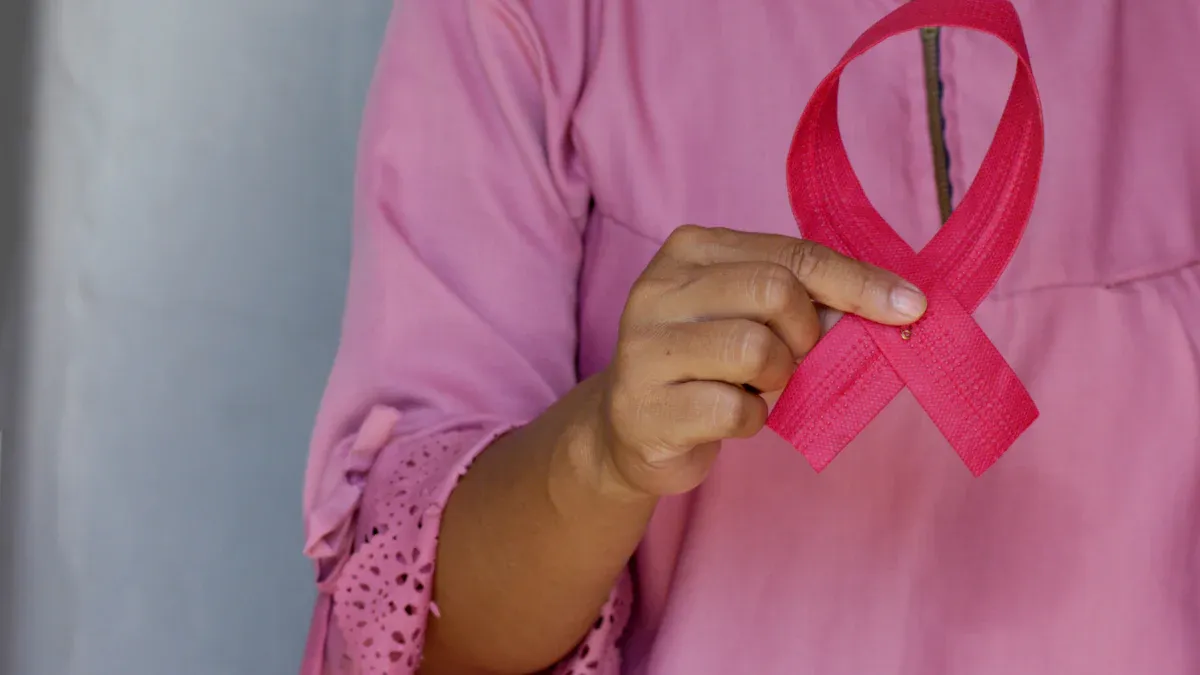12 Practical Tips to Manage Anxiety During Cancer Treatment

Facing cancer treatment can feel overwhelming, and many patients wonder how to cope with anxiety during cancer treatment. You might find yourself battling not just physical symptoms but also emotional ones like anxiety. Did you know that about 20% of cancer patients experience anxiety during treatment? For those with advanced cancer, this number can rise to nearly 35%. These feelings are normal, but they don’t have to control your life. Research shows that strategies like mindfulness and therapy can significantly reduce anxiety and improve well-being. You’re not alone in this journey, and there are effective ways to learn how to cope with anxiety during cancer treatment, helping you regain a sense of calm and control.
Key Takeaways
Try mindfulness and meditation to relax your mind. Deep breathing can lower stress and help you feel better.
Talk to a counselor to share your feelings. Therapy, like cognitive-behavioral therapy, can teach you to handle anxiety well.
Write in a journal to share your thoughts. Writing worries and listing things you're thankful for can help you feel clearer and more positive.
Eat healthy meals with good nutrients. Foods with magnesium, omega-3s, and B vitamins can help your mind and lower anxiety.
Create a support system by talking to trusted friends or joining a group. Being with others can make you feel less alone.
How to Cope with Anxiety During Cancer Treatment: Emotional Well-Being

Practice Mindfulness and Meditation
Focus on breathing exercises to calm the mind.
When anxiety strikes, your breathing often becomes shallow and rapid. Practicing deep breathing can help you regain control. Try this: inhale deeply through your nose for four seconds, hold your breath for four seconds, and exhale slowly through your mouth for six seconds. Repeat this cycle a few times. This simple exercise can calm your mind and reduce stress.
Use guided meditation apps or videos for support.
If you’re new to meditation, apps like Calm or Headspace can guide you through the process. These tools offer short, easy-to-follow sessions tailored to beginners. Research shows that mindfulness-based meditation can significantly reduce anxiety and depression in cancer patients. For example, an 8-week mindfulness program for women with breast cancer showed decreased anxiety levels and improved emotional well-being.
Study Title | Findings |
|---|---|
The efficacy of mindfulness-based meditation therapy on anxiety, depression, and spirituality in Japanese patients with cancer. | Demonstrated significant reduction in anxiety and depression levels among cancer patients. |
Changes in cerebral blood flow and anxiety associated with an 8-week mindfulness programme in women with breast cancer. | Showed a decrease in anxiety levels linked to changes in cerebral blood flow. |
The effect of mindfulness-based therapy on symptoms of anxiety and depression in adult cancer patients and survivors: A systematic review and meta-analysis. | Confirmed the effectiveness of mindfulness-based therapy in alleviating anxiety and depression symptoms in cancer patients. |
Seek Professional Counseling
Consider therapy with a licensed counselor or psychologist.
Talking to a professional can make a world of difference. Therapists trained in cancer-related anxiety can help you process your emotions and develop coping strategies. Studies show that psychosocial interventions improve emotional adjustment for cancer patients. Patients who receive therapy often report better emotional well-being compared to those who don’t.
Explore cognitive-behavioral therapy (CBT) for anxiety management.
CBT is a proven method for managing anxiety. It helps you identify negative thought patterns and replace them with healthier ones. In one study, cancer patients who participated in an 8-week CBT program reported significant improvements in anxiety and coping skills. This approach can empower you to face challenges with greater confidence.
A meta-analysis of 45 studies found that psychosocial interventions significantly improved emotional adjustment in cancer patients.
In a clinical trial, CBT participants showed better coping skills and reduced anxiety compared to those receiving supportive counseling.
Individual therapy using CBT techniques also improved problem-solving skills and reduced distress among cancer patients.
Express Yourself Through Journaling
Write down worries to process emotions and gain clarity.
Journaling can be a powerful tool for managing anxiety. Writing down your thoughts helps you process emotions and gain clarity. You don’t need to write perfectly—just let your feelings flow onto the page. Studies show that journaling for just 15 minutes, three times a week, can reduce anxiety and improve well-being.
Use gratitude journaling to focus on positive aspects of life.
Gratitude journaling shifts your focus to the good things in your life. Each day, write down three things you’re grateful for. They can be as simple as a kind word from a friend or a sunny day. This practice can help you cultivate a more positive outlook, even during challenging times.
Tip: Keep a small notebook by your bedside to jot down your thoughts or gratitude entries before sleeping. This habit can help you end your day on a calming note.
How to Cope with Anxiety During Cancer Treatment: Physical Health
Maintain a Balanced Diet
Eat nutrient-rich foods to support physical and mental health.
What you eat can play a big role in how you feel emotionally. Certain foods are known to help reduce anxiety and improve your mood. For example, magnesium-rich foods like leafy greens may calm your nerves, while zinc-rich options like cashews can lower anxiety levels. Omega-3 fatty acids, found in fatty fish, have been shown to reduce anxiety in medical students. Adding probiotic-rich foods like sauerkraut to your meals may also help ease social anxiety.
Here’s a quick guide to anxiety-reducing foods:
Dietary Component | Effect on Anxiety |
|---|---|
Magnesium-rich foods | May help calm anxiety; low magnesium linked to increased anxiety in mice. |
Zinc-rich foods | Linked to lowered anxiety levels. |
Omega-3 fatty acids | Shown to help reduce anxiety in a study on medical students. |
Probiotic-rich foods | Linked to fewer symptoms of social anxiety. |
Asparagus | Approved for its anti-anxiety properties by the Chinese government. |
B vitamin-rich foods | Help spur the release of neurotransmitters that improve mood. |
Antioxidant-rich foods | May help ease symptoms of anxiety disorders due to correlation with lowered antioxidant state. |
Avoid excessive caffeine or sugar, which can increase anxiety.
Caffeine and sugar might seem like quick energy boosters, but they can make anxiety worse. Too much caffeine can lead to jitteriness and racing thoughts, while sugar spikes can leave you feeling drained and irritable. Try swapping sugary snacks for fruits or nuts and opt for herbal teas instead of coffee. These small changes can make a big difference in how you feel.
Stay Physically Active
Engage in light exercises like walking or yoga to release endorphins.
Physical activity doesn’t have to be intense to help you feel better. Even light exercises like walking or yoga can boost your mood by releasing endorphins, your body’s natural stress relievers. Studies show that group exercise training for women with breast cancer reduced anxiety levels and improved overall health.
Consult your doctor for safe exercise options during treatment.
Before starting any exercise, talk to your doctor. They can recommend activities that are safe and suitable for your condition. Research has shown that physical activity improves cardiorespiratory fitness and reduces anxiety in cancer patients after chemotherapy. Whether it’s stretching, swimming, or gentle aerobics, find something you enjoy and stick with it.
Prioritize Rest and Sleep
Create a calming bedtime routine to improve sleep quality.
A good night’s sleep can work wonders for your mental health. Create a bedtime routine that helps you wind down. Dim the lights, listen to soothing music, or read a book. Avoid screens before bed, as they can disrupt your sleep cycle.
Use relaxation techniques to ease into restful sleep.
Relaxation techniques like progressive muscle relaxation or guided imagery can help you fall asleep faster. Picture yourself in a peaceful place, like a beach or forest, and focus on the sounds and sensations. These practices can quiet your mind and prepare your body for deep, restorative sleep.
How to Cope with Anxiety During Cancer Treatment: Social Support

Build a Support Network
Share your feelings with trusted friends or family members.
Opening up to someone you trust can lighten the emotional load. Whether it’s a close friend, a family member, or even a coworker, sharing your thoughts can help you feel less isolated. Talking about your fears and worries doesn’t make you weak—it makes you human. Sometimes, just saying things out loud can bring clarity and relief.
Join a cancer support group to connect with others who understand.
Support groups can be a lifeline during cancer treatment. They connect you with people who truly understand what you’re going through. These groups provide a safe space to share experiences, exchange advice, and find comfort in knowing you’re not alone.
Elizabeth Bouchard, MA, PhD, states, "Patients who have a good social support system tend to have better outcomes." This highlights the significant role that social support plays in improving cancer treatment outcomes.
Communicate with Your Care Team
Ask questions and express concerns to reduce uncertainty.
Clear communication with your care team can ease your anxiety. Don’t hesitate to ask questions about your treatment plan, side effects, or anything else that’s on your mind. When you understand what’s happening, it’s easier to feel in control.
Work with your care team to create a treatment plan that feels manageable.
Collaborating with your doctors and nurses can make your treatment feel less overwhelming. Share your concerns and preferences so they can tailor the plan to suit your needs.
Outcome | Evidence |
|---|---|
Good patient-centered communication skills improve satisfaction. | |
Increased quality of life | Effective communication is linked to better quality of life. |
Reduced patient anxiety | Clear communication helps in reducing anxiety and improving symptom control. |
Adherence with treatment recommendations | Patients are more likely to follow treatment plans when communication is effective. |
Enhanced accrual to clinical trials | Improved communication can lead to better participation in clinical trials. |
Improved disease-related understanding | Patients gain a better understanding of their condition through effective communication. |
Set Boundaries and Ask for Help
Delegate tasks to reduce stress and focus on self-care.
You don’t have to do everything yourself. Let others help with daily tasks like cooking, cleaning, or running errands. Delegating gives you more time to focus on your well-being.
Learn to say no to activities that feel overwhelming.
It’s okay to say no. Protecting your energy is essential during treatment. If an activity feels too demanding, politely decline. Setting boundaries helps you prioritize what truly matters.
A report by CLIC Sargent emphasized the importance of staying connected with friends and family, sharing experiences with others facing similar challenges, and having access to supportive resources. These steps can significantly improve mental health during cancer treatment.
Techniques like relaxation-based interventions and group therapy can also help reduce anxiety.
Self-help groups and family therapy offer additional layers of support.
By building a strong support network, communicating openly with your care team, and setting boundaries, you can create a more manageable path through treatment. These strategies are key to learning how to cope with anxiety during cancer treatment.
How to Cope with Anxiety During Cancer Treatment: Daily Coping Strategies
Use Distraction Techniques
Engage in hobbies or activities that bring joy and relaxation.
When anxiety feels overwhelming, shifting your focus can help. Dive into hobbies that bring you joy, whether it’s painting, gardening, or solving puzzles. These activities keep your mind engaged and provide a sense of accomplishment. Even something as simple as coloring can be a soothing escape.
Watch uplifting movies or listen to music to shift focus.
Entertainment can be a powerful tool for distraction. Watch a feel-good movie or listen to your favorite playlist. Music, especially calming tunes, can lower stress levels and improve your mood. Try creating a playlist of songs that make you smile or transport you to a happy memory.
Practice Positive Affirmations
Repeat affirmations to build resilience and self-confidence.
Positive affirmations can help you stay grounded. Start your day by saying, “I am strong,” or “I can handle this.” Repeating these phrases trains your mind to focus on your strengths. Over time, this practice can boost your confidence and reduce self-doubt.
Focus on statements that reinforce hope and strength.
Choose affirmations that inspire hope. Phrases like, “I am healing every day,” or “I am surrounded by love and support,” can remind you of the positives in your life. Write them down and place them where you’ll see them often, like on your mirror or fridge.
Explore Complementary Therapies
Try yoga, reflexology, or acupuncture to promote relaxation.
Complementary therapies like yoga, reflexology, and acupuncture can ease anxiety and promote relaxation. Yoga combines gentle movement and breathing exercises, helping you feel more centered. Reflexology and acupuncture target specific points in your body to release tension. Research shows these therapies can significantly reduce stress and improve coping skills for cancer patients.
Use creative outlets like art or writing to express emotions.
Creative activities like drawing, painting, or writing can be therapeutic. They allow you to express emotions that might be hard to put into words. Whether it’s sketching a picture or jotting down your thoughts, these outlets can help you process feelings and find relief.
The American Society of Clinical Oncology (ASCO) has endorsed evidence-based guidelines recommending complementary therapies during and after breast cancer treatment. While these therapies don’t change the course of the disease, they play a vital role in helping you manage anxiety and improve your quality of life.
Tip: Experiment with different therapies to find what works best for you. Everyone’s journey is unique, and what soothes one person may not work for another.
Managing anxiety during cancer treatment can feel overwhelming, but these 12 practical tips offer a roadmap to emotional, physical, and social well-being. From mindfulness and journaling to building a support network, each strategy helps you regain control and find moments of calm. Research shows that combining approaches like cognitive-behavioral therapy, relaxation techniques, and group support can significantly reduce anxiety and improve your quality of life.
Take small, consistent steps. Whether it’s a breathing exercise or a gratitude journal entry, every effort counts. Remember, seeking help isn’t a weakness—it’s a sign of strength. You’re not alone in this journey. Explore resources like mental health hotlines, cancer support organizations, or mindfulness apps to guide you further.
Note: Your well-being matters. Reach out, connect, and take it one day at a time.
FAQ
What should I do if anxiety feels overwhelming during treatment?
Take a moment to pause and breathe deeply. Try grounding techniques like focusing on your senses or repeating a calming phrase. If it persists, reach out to your care team or a counselor for support.
Tip: Keep a list of calming activities handy, like listening to music or journaling.
Can I still exercise if I feel tired from treatment?
Yes, but keep it light. Gentle activities like stretching, yoga, or short walks can help boost your mood without draining your energy. Always check with your doctor before starting any new exercise routine.
How can I talk to my family about my anxiety?
Be honest and open. Share how you’re feeling and let them know how they can support you. Sometimes, just saying, “I’m feeling anxious today,” can start the conversation.
Note: It’s okay to ask for specific help, like running errands or simply listening.
Are there foods that can help reduce anxiety?
Yes! Foods rich in magnesium, omega-3s, and B vitamins can support your mental health. Try leafy greens, fatty fish, nuts, and whole grains. Avoid caffeine and sugar, as they can increase anxiety.
Should I join a cancer support group?
Absolutely. Support groups connect you with others who understand what you’re going through. They offer a safe space to share experiences, gain advice, and feel less alone. Many find them incredibly comforting and empowering.
Reminder: Look for local or online groups that fit your needs and schedule.
See Also
An In-Depth Overview of Various Cancer Types
Choroid Plexus Carcinoma: Key Symptoms and Treatment Options
Essential Information on Symptoms of Adrenocortical Carcinoma
Exploring Symptoms and Treatment Approaches for Duodenal Cancer
Insights into Symptoms and Treatments of Adrenocortical Adenoma

